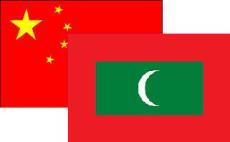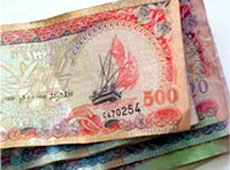Indian media has reported that the country will re-open its US$100million standby credit facility to the Maldives during the scheduled visit of newly elected President Abdulla Yameen later this month.
Whilst the President’s Office was unable to comment on the validity of the story, the New Indian Express has today reported that the Indian Government is expected to “unfreeze” the remaining part of the loan.
The Indian government agreed to grant the facility during an official state visit by Prime Minister Manmohan Singh in 2011, in order to help the Maldives meet short-term budgetary needs.
The first installment of US$30 million was granted in October 2011, with a further installment of US$20million released in time for the early 2012 visit of President Dr Mohamed Waheed to India.
A third installment of the facility however, was delayed after tensions between the Indian and Maldivian governments rose just weeks ahead of the eviction of the Indian GMR group which had been undertaking the development of Ibrahim Nasir International Airport.
Whilst the official reason given for the delay in the disbursal of the third loan installment was described as a result of the Maldives Government’s failure to complete the required paperwork, a diplomatic source at the time suggested that perceived anti-Indian rhetoric from senior political figures could yet have a bearing on future financial assistance.
The failure to secure the third credit installment was soon followed by the Indian government calling in US$100 million worth of debt.
Despite the current governing Gulhifaivaa Coalition comprising many of the parties that made up the previous administration, President Yameen has made improved relations with India a top priority after winning the November 16 run-off election.
Yameen’s PPM suggested the termination of the GMR agreement – currently the subject of a US$1.4 billion arbitration case in Singapore – was done against its advice.
In the weeks following his assumption of office, Yameen has talked openly of the potential of Indo-Maldivian relations, whilst the Indian High Commissioner to the Maldives has called the country’s bilateral ties “privileged”.
After Yameen had written to Indian PM Singh inviting him to visit the Maldives as soon as he was able, the President’s Office announced this week that Yameen would be visiting India on his first official state visit on December 22.
Budget support
Local media has today reported that a revised budget will be sent to the Majlis today, after repeated delays required to accommodate the campaign pledges of President Yameen.
Finance Minister Abdulla Jihad – reappointed to his position under the new president – had presented a MVR 16.4 billion budget for 2014 with a projected deficit of 2.5 percent of GDP to parliament on October 30.
Yameen has expressed concern over the economic vulnerability of the Maldives and pledged to reduce state expenditure by MVR 1 billion.
“State debt is sky high. The state budget’s expenses are extremely high. Hence, we have to prioritise reducing state expenditure. I will start work very soon to reduce budget expenses,” Yameen said during his inauguration speech.
The Maldives Monetary Authorities’ (MMA) most recent quarterly review noted that Government finances had “further deteriorated in the first six months of 2013” due to a sizeable shortfall in expected revenue coupled with a marked increase in recurrent expenditure.
“These developments have resulted in a widening of the budget deficit as indicated by the large financing requirement of the government during the first six months of 2013. The difficulties in accessing long-term foreign funds to finance the budget deficit resulted in the government resorting to the Maldives Monetary Authority and other domestic sources to finance its growing deficit,” the report stated.
The Yameen administration also announced earlier this week the securing of 50 million yuan (US$8.2 million) in Chinese grant aid “for the implementation of developmental projects and the advancement of public services.”
The MMA’s November figures showed that gross international reserves had fallen in monthly terms whilst showing a slight year-on-year increase. The country was reported to have enough reserves to cover 2 and a half months’ worth of imports.
 In September 2012, President Waheed told
In September 2012, President Waheed told  electricity and phone bills if funds were not transferred from the MVR 1.8 billion (US$117 million) Public Sector Investment Programme (PSIP).
electricity and phone bills if funds were not transferred from the MVR 1.8 billion (US$117 million) Public Sector Investment Programme (PSIP).